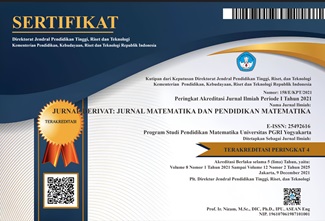Etnomatematika: Persamaan Garis Lurus dengan Media Geogebra
DOI:
https://doi.org/10.31316/j.derivat.v8i2.1972Abstract
The development of GeoGebra media is a technology contribution to the education's world, especially mathematics. The use of GeoGebra media and its association with egrang game aim to instill the concept of parallelism, perpendicularity, crossing, and slope of the line. This study aims to see how the students mathematics understanding ability is and whether the enhancement of it by using Geogebra media is better than ordinary learning. The samples were students in grade VIII at SMPN 1 Cibinong in 2019/2020. The number of samples is 60 students. This research is a quasi-experimental research design with a non–equivalent control group. The instrument was a test (pretest and posttest) to see the n gain of understanding ability. Data were analyzed using the Mann-Whitney test. The results are students mathematics understanding ability with Geogebra is not better than without Geogebra and the enhancement of it by using Geogebra media is better than without Geogebra media at SMPN 1 Cibinong in 2019/2020.
Keywords: GeoGebra Media, Ethnomathematics, Understanding Ability
Â
References
Agung, S. (2017). Pemanfaatan Aplikasi Geogebra dalam Pembelajaran Matematika SMP. Seminar Nasional Universitas COkroaminoto Palopo, 03(1), 312–322.
Badrullah. (2020). Pendekatan Etnomatematika dalam Peningkatan Kompetensi Dasar Pola Bilangan Bulat Siswa Sekolah Dasar. Jurnal Sipatokkong BPSDM Sulsel, 1(2010), 123–135.
Batubara, I. H. (2019). Peningkatan Kemampuan Berpikir Kritis Mahasiswa melalui Metode Penemuan Terbimbing Berbantuan Software Geogebra pada Mata Kuliah Kalkulus Peubah Banyak di FKIP UMSU. MES: Journal of Mathematics Education and Science, 4(2), 152–159. https://doi.org/10.30743/mes.v4i2.1291
Hendriana, H., Rohaeti, E. E., & Sumarmo, U. (2018). Hard Skills dan Soft Skills Matematika Siswa (N. F. Atif (ed.); Kedua). PT Refika Aditama.
Jelatu, S., Sariyasa2, & Ardana, I. M. (2018). Pengaruh Penggunaan Media GeoGebra terhadap Pemahaman Konsep Geometri Ditinjau dari Kemampuan Spasial Siswa. Jurnal Pendidikan Dan Kebudayaan Missio, 10(2), 162–171.
Kamarullah, K. (2017). Pendidikan Matematika Di Sekolah Kita. Al Khawarizmi: Jurnal Pendidikan Dan Pembelajaran Matematika, 1(1), 21. https://doi.org/10.22373/jppm.v1i1.1729
Maryani, E. (2021). Meningkatkan Kemampuan Pemahaman Matematis Melalui Model Problem Based Learning Menggunakan Software Geogebra Dan Dampaknya Terhadap Kemandirian Belajar Siswa Smk. VOCATIONAL: Jurnal Inovasi Pendidikan Kejuruan, 1(1), 48–57. https://doi.org/10.51878/vocational.v1i1.81
Maryati. (2016). Meningkatkan Kemampuan Pemahaman dan Penalaran Matematis serta Kemandirian Belajar Matematika Siswa SMP melalui Pembelajaran Kontekstual.
Murizal, A., Yarman, & Yerizon. (2012). Pemahaman Konsep Matematis dan Model Pembelajaran Quantum Teaching. Jurnal Pendidikan Matematika, 1(1), 19–23.
Nurdin, E., Ma’aruf, A., Amir, Z., Risnawati, Noviarni, & Azmi, M. P. (2019). Pemanfaatan Video pembelajaran Berbasis Geogebra untuk Meningkatkan Kemampuan Pemahaman Konsep Matematis Siswa SMK. Jurnal Riset Pendidikan Matematika, 6(1), 87–89.
Tenis, E. R. (2021). Kajian Etnomatematika pada Proses Pernikahan Masyarakat Amarasi Barat Baun. ASIMTOT (JURNAL KEPENDIDIKAN MATEMATIKA), 3(1), 35 – 43. https://journal.unwira.ac.id/index.php/
Utari, V. (2012). Peningkatan Kemampuan Pemahaman Konsep melalui Pendekatan PMR dalam Pokok Bahasan Prisma dan Limas. Jurnal Pendidikan Matematika, 1(1), 33–38.
Downloads
Published
Issue
Section
Citation Check
License
Authors who publish with this journal agree to the following terms:
-
Authors retain copyright and grant the journal right of first publication with the work simultaneously licensed under a Creative Commons Attribution-ShareAlike 4.0 International License that allows others to share the work with an acknowledgment of the work's authorship and initial publication in this journal.
- Authors are able to enter into separate, additional contractual arrangements for the non-exclusive distribution of the journal's published version of the work (e.g., post it to an institutional repository or publish it in a book), with an acknowledgment of its initial publication in this journal.
- Authors are permitted and encouraged to post their work online (e.g., in institutional repositories or on their website) prior to and during the submission process, as it can lead to productive exchanges, as well as earlier and greater citation of published work (See The Effect of Open Access).







